Herbal tea blends combat allergies effectively by utilizing the natural properties of various herbs. Ingredients like nettle act as antihistamines, reducing allergy symptoms, while chamomile and ginger fight inflammation and soothe irritation. These blends keep you hydrated, thinning mucus and easing congestion. Plus, the calming effects of herbs help you manage stress during allergy flare-ups. Consuming these tailored mixtures regularly can lead to noticeable relief and enhance your overall well-being. If you're curious about specific blends, brewing techniques, or ways to personalize your experience, you'll find plenty of valuable insights to explore further.
Understanding Allergies and Their Triggers
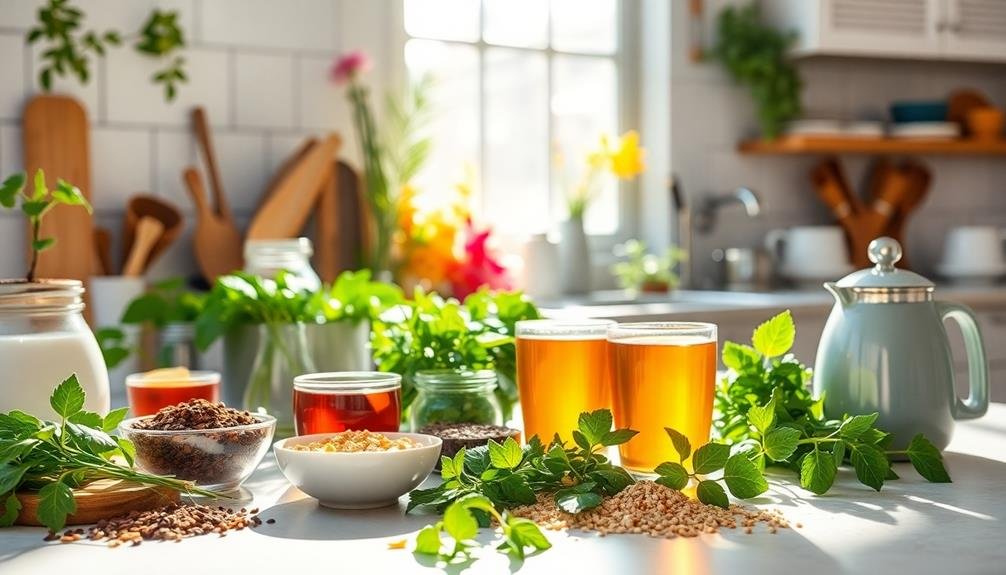
Allergies can feel like an unwelcome storm, disrupting your daily life with sneezing, itching, and discomfort. Understanding what triggers these reactions is crucial for managing your symptoms effectively. Allergies occur when your immune system overreacts to typically harmless substances, known as allergens. Common triggers include pollen, dust mites, pet dander, and certain foods.
You might notice that specific times of the year exacerbate your symptoms, especially during spring or fall when pollen counts soar. If you're allergic to dust mites, you may find your symptoms worsen indoors, particularly in bedrooms or living areas. Knowing these triggers allows you to take proactive steps to minimize exposure.
You should also consider cross-reactivity; for instance, if you're allergic to certain fruits, you might react to related pollen. It's crucial to keep track of your allergy symptoms and when they occur to identify patterns.
Consult with a healthcare provider for proper testing, which can help pinpoint specific allergens. By understanding your allergies and their triggers, you can better navigate your environment, reduce discomfort, and take control of your health.
Benefits of Herbal Tea for Allergies
When you're battling allergy symptoms, herbal tea can be a soothing ally in your wellness routine. These warm, flavorful brews not only provide comfort but also offer several benefits that can help alleviate your discomfort.
- Natural anti-inflammatory properties: Many herbal teas contain ingredients that reduce inflammation, easing the swelling and irritation caused by allergies.
- Hydration support: Staying hydrated is essential during allergy season. Herbal tea contributes to your fluid intake, helping to thin mucus and alleviate congestion.
- Calming effects: The ritual of sipping herbal tea can be a stress reliever, promoting relaxation and overall well-being, which is important when you're feeling under the weather.
Incorporating herbal tea into your daily routine can make a significant difference in managing your allergy symptoms.
Whether you choose chamomile, peppermint, or ginger, each blend can provide unique benefits.
By enjoying a cup of herbal tea, you're not only treating your symptoms but also nurturing your body with natural ingredients.
Key Ingredients in Allergy-Fighting Blends
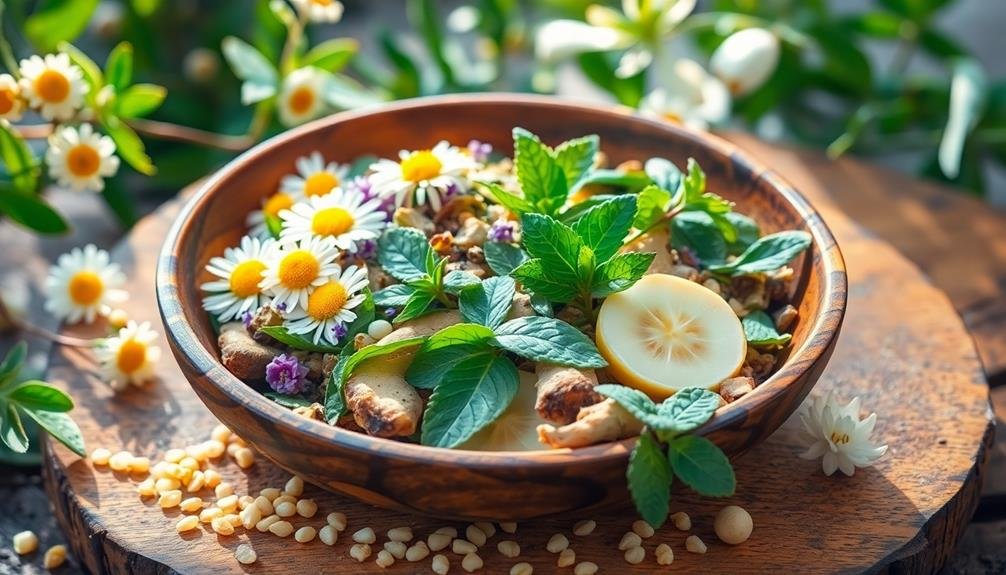
Exploring the key ingredients in allergy-fighting herbal tea blends can empower you to choose the most effective options for relief. Look for ingredients like nettle, which contains natural antihistamines, helping to reduce allergy symptoms.
Another powerful component is chamomile, known for its anti-inflammatory properties that soothe irritated respiratory tracts.
Peppermint is another fantastic addition. Its menthol content can clear nasal passages, making it easier to breathe.
Ginger also plays an essential role; it's an anti-inflammatory agent that helps alleviate congestion and boosts your immune system.
Don't overlook elderflower, as it's excellent for reducing mucus production and calming coughs.
Rooibos is another ingredient to evaluate; it's rich in antioxidants and supports overall respiratory health.
Lastly, adding lemon balm can help ease stress and anxiety, which often accompany allergy flare-ups.
When you choose blends with these key ingredients, you're arming yourself with nature's best defenses against allergies. By focusing on these elements, you can create or select herbal teas that'll provide you with the relief you need, making allergy season a little more manageable.
Popular Herbal Tea Blends for Relief
When you're looking for relief from allergies, certain herbal tea blends can really help.
Consider trying a chamomile and peppermint blend for its soothing properties, or a ginger and turmeric mix for its anti-inflammatory benefits.
Echinacea and elderflower fusion is another great option that boosts your immune system.
Chamomile and Peppermint Blend
A soothing blend of chamomile and peppermint can offer significant relief for those struggling with allergies. Both herbs have unique properties that work synergistically to ease your symptoms.
Chamomile is known for its anti-inflammatory effects, helping to calm your irritated nasal passages. Peppermint, on the other hand, acts as a natural decongestant, making it easier for you to breathe.
Here are a few reasons why this blend is worth trying:
- Relief from nasal congestion: Peppermint helps clear your airways, reducing that stuffy feeling.
- Soothing properties: Chamomile can help relax your body, further easing allergy-related stress.
- Antioxidant-rich: Both herbs are packed with antioxidants, supporting your immune system during allergy season.
When you brew a cup of chamomile and peppermint tea, you're not just indulging in a comforting beverage; you're also giving your body a helping hand in fighting off those pesky allergy symptoms.
Enjoy this delightful blend and feel the relief wash over you, allowing you to tackle your day with ease.
Ginger and Turmeric Mix
The Ginger and Turmeric Mix is a powerful herbal tea blend that can provide substantial relief from allergy symptoms. Ginger, known for its anti-inflammatory properties, helps soothe the respiratory system, easing congestion and reducing throat irritation.
Turmeric complements this effect by enhancing your immune response, thanks to its active compound, curcumin. Together, they create a potent combination to combat allergy-related discomfort.
When you brew this tea, you not only enjoy a warm, spicy flavor but also harness the benefits of these natural ingredients. Add a touch of honey or lemon for extra flavor and additional soothing effects.
Drinking this blend regularly can help strengthen your body's defenses against allergens, making it an ideal choice during allergy season.
You can easily prepare this mix by steeping fresh ginger and turmeric root or using high-quality herbal tea bags. Sipping on this tea throughout the day can keep your symptoms at bay, allowing you to breathe easier and feel more comfortable.
With consistent consumption, you'll likely notice a reduction in allergy flare-ups, making the Ginger and Turmeric Mix a go-to remedy for relief.
Echinacea and Elderflower Fusion
Echinacea and elderflower fusion offers a delightful way to alleviate allergy symptoms while boosting your immune system. This herbal blend combines the powerful properties of echinacea, known for its immune-enhancing effects, with elderflower, which is recognized for its anti-inflammatory and soothing qualities.
Together, they create a flavorful tea that not only helps you feel better but also supports your body's natural defenses.
Here's what makes this fusion stand out:
- Immune Support: Echinacea helps stimulate your immune response, making it easier for your body to fight off allergens.
- Anti-Inflammatory: Elderflower can reduce inflammation, easing the discomfort of sinus congestion and other allergy symptoms.
- Rich in Antioxidants: Both herbs are packed with antioxidants that combat oxidative stress, promoting overall health.
Brew a cup of echinacea and elderflower tea when you notice those pesky allergy symptoms creeping in. Sip it slowly, and let the warm liquid soothe your throat while its ingredients work their magic.
You'll find that this herbal tea blend not only tastes great but also empowers your body to tackle seasonal allergies with greater ease.
How to Make Your Own Blends
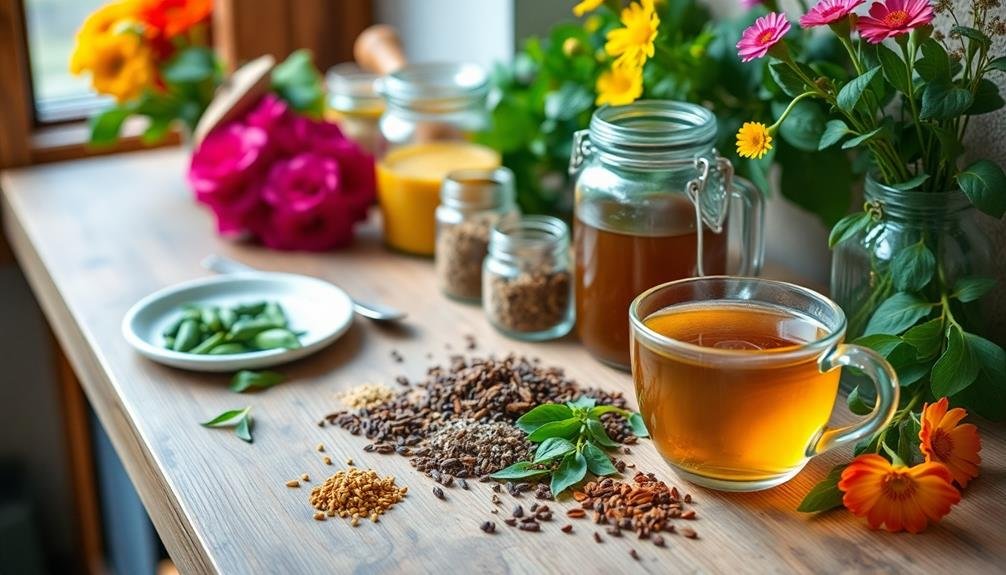
Creating your own herbal tea blends can be a fun and rewarding experience.
You'll want to select your ingredients wisely, learn the best brewing techniques, and keep your blends fresh with proper storage tips.
Let's explore how to craft the perfect mix for your needs!
Selecting Ingredients Wisely
Crafting your own herbal tea blends for allergies can be a rewarding experience that empowers you to find relief naturally. By selecting the right ingredients, you can create a blend that targets your specific symptoms and preferences. Here's how to choose wisely:
- Look for antihistamines: Ingredients like nettle and chamomile can help reduce histamine reactions.
- Incorporate anti-inflammatory herbs: Consider adding ginger or turmeric to combat inflammation and soothe your system.
- Select soothing elements: Licorice root and peppermint can ease irritation in your throat and respiratory system.
Start by evaluating your allergy symptoms. Do you struggle with sneezing, congestion, or itchy eyes?
Once you identify your needs, you can mix and match ingredients accordingly. For instance, if you're dealing with respiratory issues, blending eucalyptus with peppermint might be beneficial.
Always remember to choose high-quality, organic herbs when possible. This guarantees you're getting the most potent benefits without harmful additives.
Don't hesitate to experiment with different ratios until you find the perfect flavor and effect. Enjoy the process, and soon you'll have your own effective herbal remedy to combat allergies!
Brewing Techniques Explained
When you're ready to brew your herbal tea blends, understanding the techniques can make all the difference in maximizing flavor and potency. Start by boiling fresh, filtered water. The temperature matters; delicate herbs like chamomile require cooler water (around 190°F), while sturdier roots like ginger thrive in boiling water.
Measure your herbs—generally, one teaspoon of dried herbs or one tablespoon of fresh herbs per cup works well. For stronger infusions, consider steeping more.
Once your water's at the right temperature, add your herbs to a teapot or infuser. Pour the hot water over them and cover to trap the steam, which helps extract essential oils and flavors.
Steeping time varies; delicate blends need about 5-7 minutes, while robust mixtures can steep for up to 15 minutes. Taste your brew during the process to find your perfect strength.
Once it's ready, strain out the herbs and enjoy your tea hot or let it cool for an iced version. Experiment with different blends and adjust the steeping times to discover what works best for your palate and allergy relief.
Storage Tips for Freshness
After you've brewed your herbal tea blends, proper storage is key to maintaining their freshness and potency.
To enjoy your blends at their best, follow these essential storage tips:
- Use airtight containers: Opt for glass jars or metal tins that seal tightly to keep moisture and air out.
- Store in a cool, dark place: Heat and light can degrade your herbs, so find a cabinet or pantry away from the stove and direct sunlight.
- Label your blends: Mark each container with the blend name and the date you made it. This helps you keep track of freshness and potency.
Brewing Techniques for Maximum Efficacy
Maximizing the benefits of herbal tea blends for allergies starts with the right brewing techniques. First, always use fresh, high-quality herbs. Whether you're using loose leaves or tea bags, freshness impacts flavor and efficacy. Measure your herbs carefully; a general rule is one teaspoon of dried herbs or one tablespoon of fresh herbs per cup of water.
Next, pay attention to water temperature. Delicate herbs like chamomile and peppermint brew best in water heated to around 190°F, while sturdier herbs, such as ginger or hibiscus, can handle boiling water.
Steep your tea for the recommended time—usually between 5 to 10 minutes. This guarantees you extract the maximum beneficial compounds without compromising flavor.
Consider using a tea infuser or a French press to make the brewing process easier. After steeping, strain the herbs and enjoy your tea warm.
For added benefits, consider adding a touch of honey or lemon, both of which can further support your immune system.
Safety Considerations and Precautions
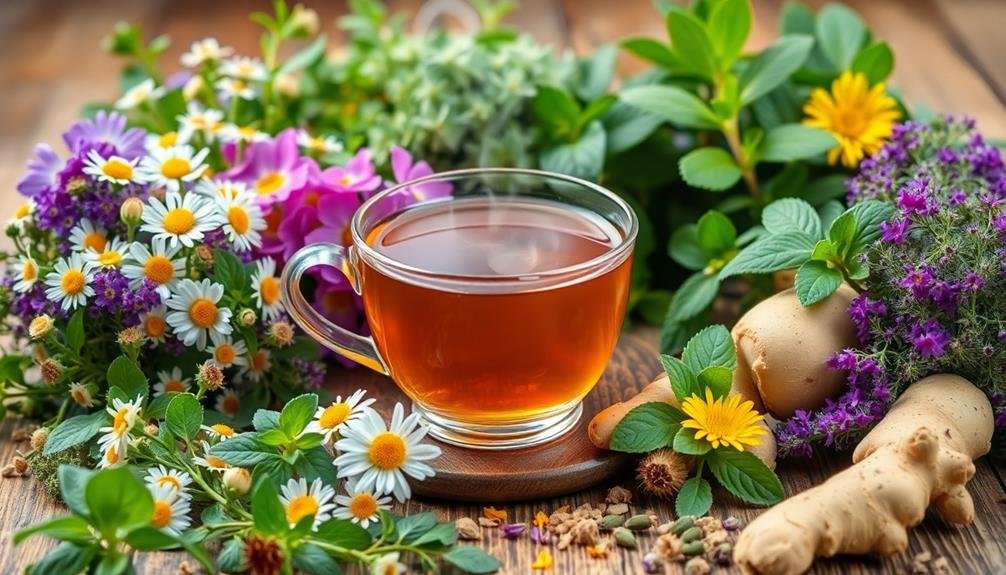
Herbal tea blends can be a soothing remedy for allergy sufferers, but it's important to prioritize safety while enjoying them. Here are some key considerations to keep in mind:
- Know Your Allergies: Before you explore a new herbal blend, check the ingredients. Some herbs, like chamomile, may cause allergic reactions in individuals sensitive to plants in the daisy family.
- Consult Your Doctor: If you're pregnant, nursing, or taking medications, it's a good idea to consult your healthcare provider. Certain herbs can interact with medications or may not be safe during pregnancy.
- Start Slowly: When trying a new blend, start with a small amount to see how your body reacts. This way, you can identify any adverse effects without overwhelming your system.
Enhancing Blends With Additional Ingredients
Once you've guaranteed your safety with herbal teas, enhancing your blends with additional ingredients can elevate their effectiveness and flavor.
Consider adding local honey, as it not only sweetens your tea but may also help your body acclimate to local pollen, potentially reducing allergy symptoms.
Citrus fruits, like lemon or orange, pack a vitamin C punch that can boost your immune system and support respiratory health. A sprinkle of ginger can bring warmth to the tea while acting as a natural anti-inflammatory, which can be beneficial during allergy season.
Peppermint leaves are another fantastic addition; they can open up your airways and provide a revitalizing taste.
You might also explore spices like cinnamon or turmeric, known for their anti-inflammatory properties.
Lastly, consider incorporating adaptogenic herbs such as ashwagandha or holy basil, which can help your body manage stress, an essential factor when dealing with allergies.
By carefully selecting these additional ingredients, you'll create a herbal tea blend that not only tastes great but also offers enhanced relief and support during allergy season.
Enjoy experimenting with different combinations to find your perfect brew!
Personalizing Your Herbal Tea Experience
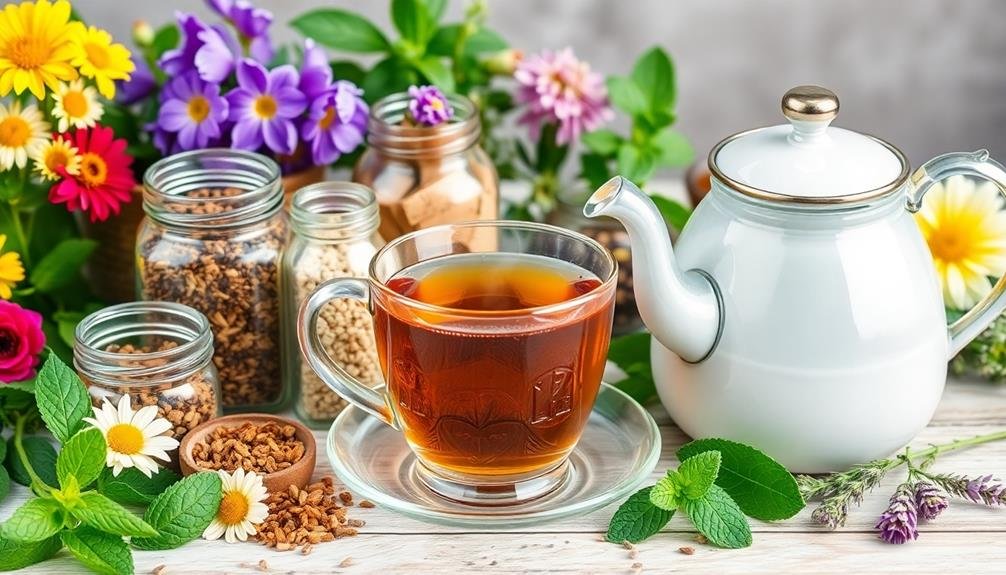
Creating a personalized herbal tea experience allows you to tailor every sip to your unique preferences and needs. By customizing your blends, you can enhance the flavors and benefits, making each cup truly yours. Here's how to get started:
- Choose Your Base: Start with a base herb like chamomile for relaxation or peppermint for a invigorating kick.
- Add Complementary Flavors: Mix in herbs and spices that support your health goals, like ginger for digestion or echinacea for immunity.
- Experiment with Sweeteners: Use honey, stevia, or even a splash of citrus to find the perfect balance.
Don't be afraid to play with proportions and ingredients to discover what works best for you. Keep a journal to note which combinations you love, and feel free to adjust as your tastes change or your health needs shift.
Incorporating seasonal herbs can also keep your tea vibrant and relevant. By personalizing your herbal tea experience, you not only make it more enjoyable but also empower yourself to combat allergies and other health issues effectively.
Frequently Asked Questions
Can Children Safely Consume Herbal Tea Blends for Allergies?
Yes, children can safely consume herbal tea blends for allergies, but it's important to consult a pediatrician first. You should verify the ingredients are suitable for their age and won't cause any adverse reactions.
How Long Does It Take to See Results From Herbal Tea?
You might start noticing results from herbal tea within a few days to a couple of weeks, depending on the blend and your individual response. Consistency in consumption usually enhances the effectiveness of the tea.
Are There Any Side Effects of Herbal Teas for Allergies?
Yes, herbal teas can have side effects. You might experience digestive issues, allergic reactions, or interactions with medications. Always consult a healthcare professional before starting any new herbal regimen to verify it's safe for you.
Can Herbal Tea Replace Conventional Allergy Medications?
Herbal tea can complement your allergy management, but it shouldn't fully replace conventional medications. You should consult with a healthcare professional to guarantee you're addressing your symptoms effectively while considering potential interactions with your current treatments.
What Is the Best Time to Drink Herbal Tea for Allergies?
You should drink herbal tea for allergies in the morning or early evening. This timing helps your body prepare for the day's allergens and promotes relaxation before bed, enhancing its soothing and healing properties.
In Summary
Incorporating herbal tea blends into your routine can be a game-changer for tackling allergies. With their natural ingredients and soothing properties, these teas not only help alleviate symptoms but also support overall wellness. By experimenting with various blends and brewing techniques, you can find what works best for you. So, take charge of your health and explore the world of herbal teas—your body will thank you for it! Enjoy your journey to allergy relief!

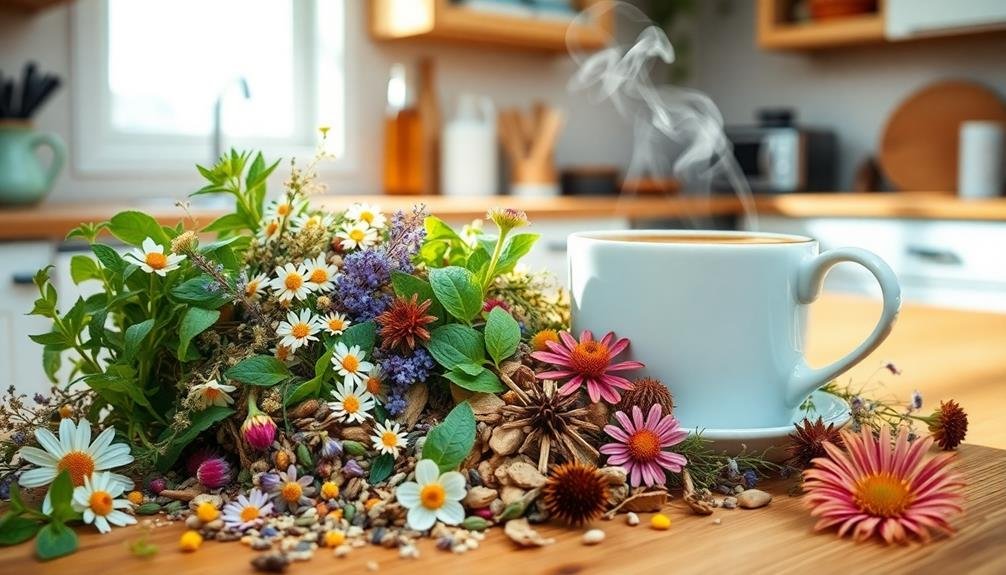



Leave a Reply